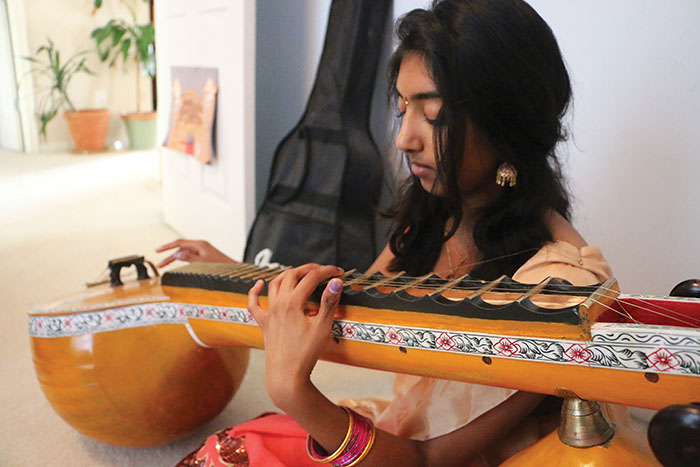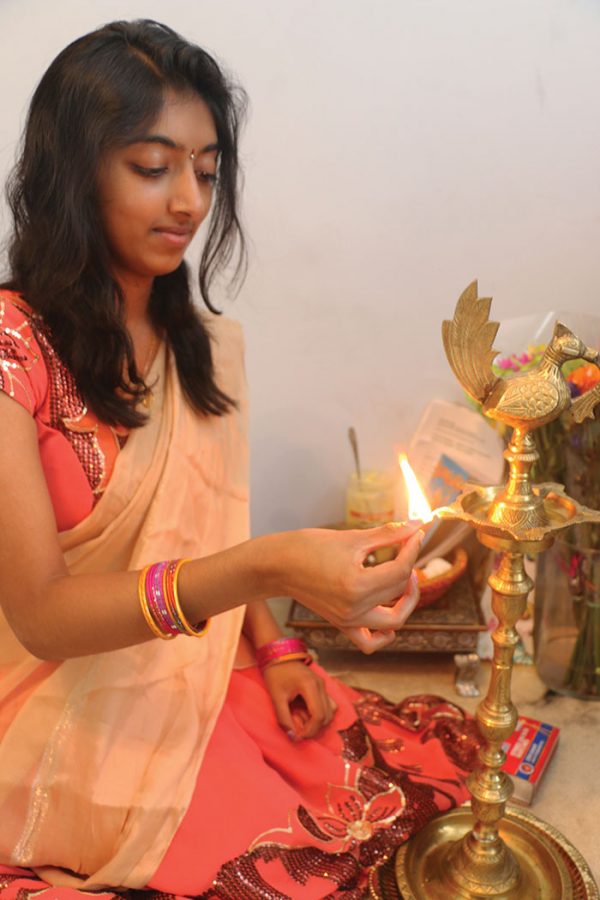Q: What is Diwali?
T: “It’s kind of a new start to a new life and a time of the year. There is a religious meaning to it, like when the gods defeat the demons, that’s one religious meaning that some people may take it as. But, I think, in terms of life lessons, Diwali does teach you a lot about being together. We light lamps to show that there’s always light and dark. Diwali actually has a lot of historical backgrounds to it; every part of India celebrates it a different way or for a different reason.”
Q: What significance does it hold to you and your family?
T: “The significance of Diwali for us is that it represents the coming together of family, not just the people within your family but other family friends, too and it’s just kind of a time of hope that the future will hold brightness– that’s what the lights are for– and that the future will hold more beginnings to come. The point of it is not only our family but other families are also part of ours, like even though we’re not blood-related we all help each other in our life, and we all kind of have a place in each other’s journey.
Q: What special traditions does your family practice?
T: “I celebrate in the style of south India, which is normally three days but the main holiday is celebrated only on one day. The main day is when we light the lamps; all the other days is just worship in front of God and the main day is where you actually light the candles, where all the family is involved. Some other places (in India) celebrate it for three days, and others celebrate it for 10. Usually our traditions include lighting the lamps around the house, and we will do fireworks, and we will make a lot of traditional food and a lot of it is just family coming together, sharing our goals as a family and what we see as a way to improve our society.
Q: What is your favorite Diwali memory?
T: “My favorite is probably when my grandparents surprised me when I was younger and that particular Diwali my grandpa gave me a globe. At that time I was really young, I didn’t know what the globe meant, that’s where this whole idea (of light and dark) came in, so he gave me a globe and (in my memory) he was like, ‘Wherever you go, this will always apply to you; there will always be light, and wherever you go, don’t stop this practice and keep living your culture, and keep moving it forward.’”
Q: How will you continue celebrating Diwali in the future?
T: “I plan on taking (my family) to India for one Diwali, and I will light lamps in my house and go to others’ (to light lamps), and I hope to develop a community so our kids and their kids will be able to practice the same thing. We have a Hindu temple in Plainfield that we go to, so taking them to a temple will be another thing. I don’t expect my children to necessarily believe in God, I just want them to understand the basic concept of Diwali that there’s always hope wherever you go.”

































![AI in films like "The Brutalist" is convenient, but shouldn’t take priority [opinion]](https://hilite.org/wp-content/uploads/2025/02/catherine-cover-1200x471.jpg)









































![Review: “The Immortal Soul Salvage Yard:” A criminally underrated poetry collection [MUSE]](https://hilite.org/wp-content/uploads/2025/03/71cju6TvqmL._AC_UF10001000_QL80_.jpg)
![Review: "Dog Man" is Unapologetically Chaotic [MUSE]](https://hilite.org/wp-content/uploads/2025/03/dogman-1200x700.jpg)
![Review: "Ne Zha 2": The WeChat family reunion I didn’t know I needed [MUSE]](https://hilite.org/wp-content/uploads/2025/03/unnamed-4.png)
![Review in Print: Maripaz Villar brings a delightfully unique style to the world of WEBTOON [MUSE]](https://hilite.org/wp-content/uploads/2023/12/maripazcover-1200x960.jpg)
![Review: “The Sword of Kaigen” is a masterpiece [MUSE]](https://hilite.org/wp-content/uploads/2023/11/Screenshot-2023-11-26-201051.png)
![Review: Gateron Oil Kings, great linear switches, okay price [MUSE]](https://hilite.org/wp-content/uploads/2023/11/Screenshot-2023-11-26-200553.png)
![Review: “A Haunting in Venice” is a significant improvement from other Agatha Christie adaptations [MUSE]](https://hilite.org/wp-content/uploads/2023/11/e7ee2938a6d422669771bce6d8088521.jpg)
![Review: A Thanksgiving story from elementary school, still just as interesting [MUSE]](https://hilite.org/wp-content/uploads/2023/11/Screenshot-2023-11-26-195514-987x1200.png)
![Review: "When I Fly Towards You", cute, uplifting youth drama [MUSE]](https://hilite.org/wp-content/uploads/2023/09/When-I-Fly-Towards-You-Chinese-drama.png)
![Postcards from Muse: Hawaii Travel Diary [MUSE]](https://hilite.org/wp-content/uploads/2023/09/My-project-1-1200x1200.jpg)
![Review: "Ladybug & Cat Noir: The Movie," departure from original show [MUSE]](https://hilite.org/wp-content/uploads/2023/09/Ladybug__Cat_Noir_-_The_Movie_poster.jpg)
![Review in Print: "Hidden Love" is the cute, uplifting drama everyone needs [MUSE]](https://hilite.org/wp-content/uploads/2023/09/hiddenlovecover-e1693597208225-1030x1200.png)
![Review in Print: "Heartstopper" is the heartwarming queer romance we all need [MUSE]](https://hilite.org/wp-content/uploads/2023/08/museheartstoppercover-1200x654.png)





